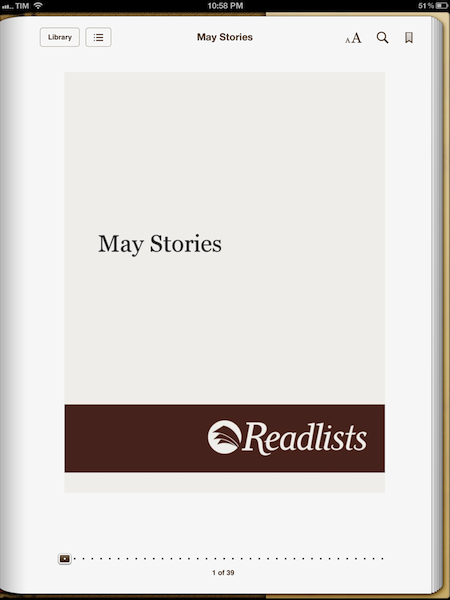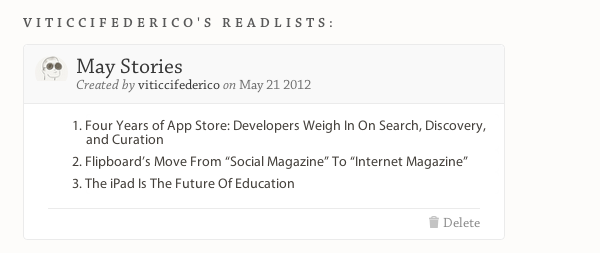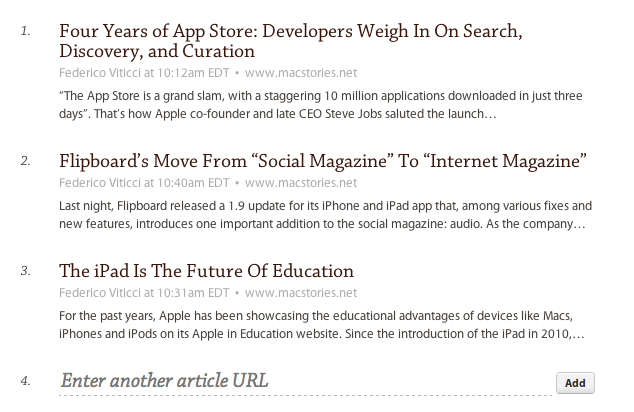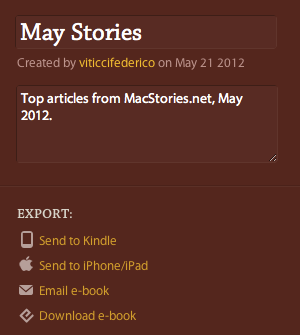In my original review of Readability for iOS, I praised the app’s focus on clean design, beautiful typography, and focus on building a different system to support web publishers as unique aspects of what could have been easily dismissed as “yet another read later” app. In particular, I wrote how, ultimately, “it comes down to habits, curiosity, and willingness to try out a new service that offers a slightly different take on saving web articles for later”.
Ever since my review, I have switched to Pocket as my personal go-to read later web service and app on iOS, as I thoroughly enjoy Pocket’s wide-ranging approach to saving everything for later, rather than just articles. Today, however, Readability is announcing a new service called Readlists, which might give many a reason to use multiple “read-later” services in tandem – and that’s because Readlists leverages Readability’s existing platform and engine to target a different segment of web reading: collecting multiple links together.
For decades now, Internet citizens have relied on bookmarking systems to archive links for future reference or perusal; services like Delicious and Pinboard allow users to save links in collections or tags, and share them publicly with profiles or widgets built through officially provided APIs. On the other hand, services like Pocket, Instapaper, and Readability have shifted the conversation to reading (or watching, or viewing) later, treating web links as single entities to save and process in a separate inbox, often not so easily embeddable or shareable on the web. Read later apps let you share the article you’ve just read on Twitter and Facebook, as well as other services; Instapaper implemented its own private social network to see what “friends are reading”; but what if you wanted to group multiple links together – say, reviews for the latest iPad or Tapbots app – and share them with the world all at once? That’s exactly the issue we faced with our own MacStories Reading List; eventually, we decided to build a manual widget that enables us to easily display aggregated links in our site’s sidebar.
A Readlist is a “mixtape for reading”. From a web app (the service doesn’t come with native app integration yet), you can create a list containing multiple links for articles and images. Readlist’s unique twist is that, while made by Arc90 and based on Readability, it doesn’t require a Readability account to operate – it’s a separate service with Readability integration. And because of this product division, bundles you create on Readlists aren’t simply archived to your Readability account – they can be downloaded as eBooks on any device.
Readlists is capable of generating iBooks-ready ePub files containing articles as “chapters” within what is actually a book you can download offline and read on any device. Using the service’s parser, text and images are extracted from webpages (not videos), ads are stripped out of view, and instead of generating a “read later view” like in Pocket or Instapaper (or Readability), an eBook is created. You can enter a title for your eBook, a description, and easily send it via email to your Kindle or iOS device. Links to Readlists can be shared with friends, and you can subscribe to other’s Readlists and download them for offline reading.
A Readlist can also be embedded on any webpage through an embed code, which will generate a fancy link-grouping widget with sharing/exporting options as the one you can see below. From a Readlist, you can jump straight to the original source by clicking on a link’s title, or you can send single items to Readability by clicking on “read later”. eBooks can only be opened in other apps that support the format, such as Kindle or iBooks (or Bookle on the Mac).
I have been able to test Readlists, and while I think it makes for a great differentiator from services like Pocket and Instapaper, there are also some aspects of the service I don’t like or fully understand yet. Firstly, while the service is marketed as separate from Readability (you don’t need an account to sign up, but you can use your Readability account), links saved to Readlists don’t contribute to publishers who signed up for Readability’s program. I asked Readability’s CEO Rich Ziade, and he told me that they’ll see “how reception goes” as far as further integrating with native apps is concerned; right now, Readlists is a separate web app that doesn’t require Readability to work.
Technically, that is true, but the service is clearly based off Readability’s existing infrastructure, and as such I was disappointed to find out links saved through Readlists aren’t contributing to publishers in any way. If not necessarily tracking saved links, I believe Readability could still track saved links that are also converted to ePub by Readability subscribers, and give publishers a small kickback for those. I am actually a strong proponent of Readability’s model for publisher – in spite of the controversies – but I think they should figure out a way to integrate Readability 100% with Readlists, and not just for the parser, read later buttons, and user profiles. I assume that, because the system is inherently different (Readability accounts Vs. Readlists ePub files), the old publisher program couldn’t be simply ported “as is” for the initial launch.
Additionally, I am curious to see how Arc90 will plan to monetize Readlists. Everything’s free right now in the “experimentation” phase, but from a product standpoint, Readlists seems well-suited as a long-term plan aimed at charging “advanced users” for more features like custom eBook covers, stats, or different code embedding options. This is pure speculation on my side, but I do believe Readlists’ unique concept could bode well for a paid product.
Readlists is undoubtedly an interesting experiment, and a different take on “saving content for later, offline”, which is something that other apps and services have been doing for years, albeit without the convenience of a portable file format.
You can check out Readlists here.





